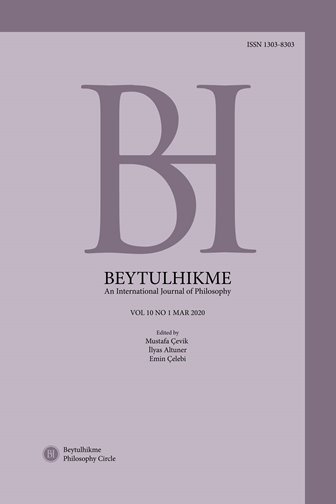Metafiziğin Temellendirilmesi Bakımından Ben-Zaman İlişkisi: Kant ve Heidegger Ekseninde Bir Çözümleme
Author :
Abstract
Heidegger, metafiziği temellendirme çabası doğrultusunda Kant’ın Saf Aklın Eleştirisi adlı eserini yorumlamıştır. Bu çalışmanın amacı, bu yorumun kilit noktası olması dolayısıyla Kant ve Heidegger ekseninde ben-zaman ilişkisini çözümlemektir. Ontolojik bilginin peşinde olan Heidegger, bu uğurda Kant’tan farklı olarak zamanı ön plana çıkarır ve bu kavrama önemli bir rol atfeder. Düşünür, böylece Kant’ın bilinebilir olanla olmayan arasında çizdiği sınırı genişletmeye çalışır. Heidegger’in bunu nasıl yaptığını açıklamak ben ve zaman kavramlarıyla aşkınlık, sonsuzluk, sonluluk, düşünme ve özbilinç kavramları arasındaki ilişkiselliğe ışık tutmayı gerektirir. Aynı zamanda söz konusu ilişkiselliği yorumlamayı amaçlayan bu çalışmada nihai olarak, Heidegger’in ilgili çabasıyla insan ve hakikat arasındaki mesafeyi kısalttığı iddia edilmektedir.
Keywords
Abstract
Heidegger interpreted Kant’s Critique of Pure Reason, in an effort to ground metaphysics. This study aims to analyze the relationship between self and time as the key point of that interpretation with reference to Kant and Heidegger. Unlike Kant, Heidegger focuses on and awards significance to the concept of time in order to attain ontological knowledge. By doing so, the philosopher pushes the boundary that Kant draws between knowable and unknowable. In order to reveal how Heidegger achieves that, one should first shed light on how self and time relate to the concepts of transcendency, infiniteness, finiteness, thinking and self-consciousness. This article, which also aims to interpret the said relationality, consequently, holds that Heidegger, reduces the distance between humans and reality through his attempt to ground metaphysics.
Keywords
- Aristoteles. (2001). Fizik. (Çev. S. Babür). İstanbul: Yapı Kredi Yayınları.
- Descartes, R. (1983). Felsefenin İlkeleri. (Çev. M. Akın). İstanbul: Say Yayınları.
- Draaisma, D. (2012). Yaşlandıkça Hayat Neden Çabuk Geçer. (Çev. G. Koca). İstan- bul: Metis Yayınları.
- Gözkan, B. (2010). Kant’tan Heidegger’e Varlığın Anlamı Meselesi. Cogito, 64, 133-152.
- Gözkan, B. (2018). Kant’ın Şemsiyesi: Kant’ın Teorik Felsefesi Üzerine Yazılar. İstan- bul: Yapı Kredi Yayınları.
- 12 Kant Kopernik’in astronomi alanında yaptığı devrimin bir benzerini kendinin metafizik alanında yaptığını iddia eder. Kopernik nasıl gezegenler ve gözlemcinin rollerini değiştirdiyse Kant da bilen ve bilinenin rollerini değiştirmiştir. Düşünüre göre özne nesneye değil nesne özneye uyar. Bkz. Kant, 1998: BXVI.
- Heidegger, M. (1997a). Kant and the Problem of Metaphysics. (Trans. R. Tarft). Indi- anapolis: Indiana University Press.
- Heidegger, M. (1997b). Phenomenological Interpretation of Kant’s Critique of Pure Reason. (Trans. P. Emad & K. Maly). Indianapolis: Indiana University Press.
- Heidegger, M. (2011). Varlık ve Zaman. (Çev. K. H. Ökten). İstanbul: Agora Ki- taplığı.
- Heidegger, M. (2013). Kant ve Metafizik Problem. (Çev. Z. Aşkın & R. Akalın). Ethos: Felsefe ve Toplumsal Bilimlerde Diyaloglar, 6 (1), 149-161.
- Kant, I. (1998). Critique of Pure Reason. (Trans. P. Guyer & A. W. Wood). Camb- ridge: Cambridge University Press.
- Kant, I. (2002). Ahlak Metafiziğinin Temellendirilmesi. (Çev. İ. Kuçuradi). Ankara: Türkiye Felsefe Kurumu Yayınları.
- Salman, S. (2017). Heidegger’in Kant Okuması: Hayalgücü, Zaman ve Sonluluk. Felsefi Düşün, 8, 153-177.
- Şenkaya, C. (2014). Düşünenin Düşünüyorum’da Düşündüğü: Kant’ın Cogito Eleş- tirisi. Felsefi Düşün, 3, 142-157. Öz: Heidegger, metafiziği temellendirme çabası doğrultusunda Kant’ın Saf Aklın Eleştirisi adlı eserini yorumlamıştır. Bu çalışmanın amacı, bu yorumun kilit noktası olması dolayısıyla Kant ve Heidegger ekseninde ben-zaman ilişkisini çözümlemektir. Ontolojik bilginin peşinde olan Heidegger, bu uğurda Kant’tan farklı olarak zamanı ön plana çıkarır ve bu kavrama önemli bir rol atfeder. Düşünür, böylece Kant’ın bilinebilir olanla olmayan arasında çizdiği sınırı genişletmeye çalışır. Heidegger’in bunu nasıl yaptığını açıklamak ben ve zaman kavramlarıyla aşkınlık, sonsuzluk, sonluluk, düşünme ve özbilinç kavramları arasındaki ilişkiselliğe ışık tutmayı gerektirir. Aynı zamanda söz konusu ilişkiselliği yorumlamayı amaçlayan bu çalışmada nihai olarak, Heidegger’in ilgili çabasıyla insan ve hakikat arasındaki mesafeyi kısalttığı iddia edilmektedir. Anahtar Kelimeler: Heidegger, Kant, metafizik, ben, zaman, düşünme, özbilinç.
